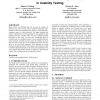Free Online Productivity Tools
i2Speak
i2Symbol
i2OCR
iTex2Img
iWeb2Print
iWeb2Shot
i2Type
iPdf2Split
iPdf2Merge
i2Bopomofo
i2Arabic
i2Style
i2Image
i2PDF
iLatex2Rtf
Sci2ools
104
Voted
ACMDIS
2000
ACM
2000
ACM
On the Contributions of Different Empirical Data in Usability Testing
Many sources of empirical data can be used to evaluate an interface (e.g., time to learn, time to perform benchmark tasks, number of errors on benchmark tasks, answers on questionnaires, comments made in verbal protocols). This paper examines the relative contributions of both quantitative and qualitative data gathered during a usability study. For each usability problem uncovered by this study, we trace each contributing piece of evidence back to its empirical source. For this usability study, the verbal protocol provided the sole source of evidence for more than one third of the most severe problems and more than two thirds of the less severe problems. Thus, although the verbal protocol provided the bulk of the evidence, other sources of data contributed disproportionately to the more critical problems. This work suggests that further research is required to determine the relative value of different forms of empirical evidence. Keywords Usability testing, empirical data, verbal prot...
Related Content
| Added | 01 Aug 2010 |
| Updated | 01 Aug 2010 |
| Type | Conference |
| Year | 2000 |
| Where | ACMDIS |
| Authors | Maria Ebling, Bonnie E. John |
Comments (0)

